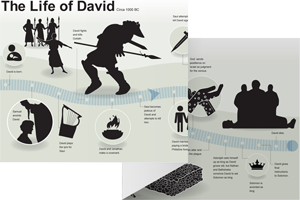24:1–22 Saul resumes his pursuit of David. Though David has an opportunity to kill Saul, he refuses. David then reveals himself to Saul and calls attention to the fact that he didn’t act against the king—evidence of his faithfulness and lack of ill will. Saul acknowledges his sin in pursuing David. |
24:1 When Saul returned See 23:27–28.
24:2 he and his men went to search for David The 15th time Saul seeks to kill David (see 16:21 and note).
24:4 am giving your enemy into your hand This prophecy, perhaps invented by his men, is not recorded in the Bible.
cut the hem of Saul’s robe Proves that David is close enough to kill Saul.
24:6 Yahweh’s anointed one In spite of Saul’s behavior toward him, David still respects him as God’s anointed. Only God can remove His anointed person (see note on 1 Sam 23:26). This will work in David’s favor once he assumes the throne.
24:8 My lord the king David uses this phrase, his most exalted address for the king, when he has a chance to kill Saul (see also 26:19).
knelt down with his face to the ground David shows proper respect and deference.
24:11 my father, see In contrast to Saul’s epithet for David, “son of Jesse” (see 20:27 and note; 20:29 and note), David refers to Saul in a loving and respectful manner.
24:12 May Yahweh judge between me and you David introduces a series of proclamations designed to pronounce his innocence.
24:13 From the wicked David may be saying that if he was really as wicked as Saul thought, he would have killed Saul. Jesus uses a similar maxim in the nt (Matt 12:35; compare Dan 12:10; Matt 7:16–20).
24:16 my son Rather than referring to him as “the son of Jesse,” he once again claims David as his own son (see 1 Sam 24:11 and note).
24:17 You are more righteous than I Saul begins his response to David’s address.
24:20 you will certainly be king This is Saul’s first public admission of David’s future succession.
24:21 that you will not cut off my descendants Saul knew that kings secured their rule by killing other possible claimants to the throne, and he asks David to not act in the usual way. This also resembles the second covenant David made with Jonathan (see 20:15).
24:22 David swore This anticipates his future benevolence toward Mephibosheth (see 20:15 and note).

|
About Faithlife Study BibleFaithlife Study Bible (FSB) is your guide to the ancient world of the Old and New Testaments, with study notes and articles that draw from a wide range of academic research. FSB helps you learn how to think about interpretation methods and issues so that you can gain a deeper understanding of the text. |
| Copyright |
Copyright 2012 Logos Bible Software. |
| Support Info | fsb |
 Loading…
Loading…

